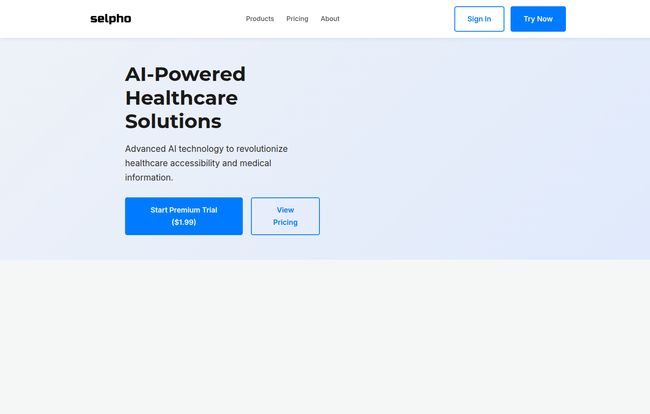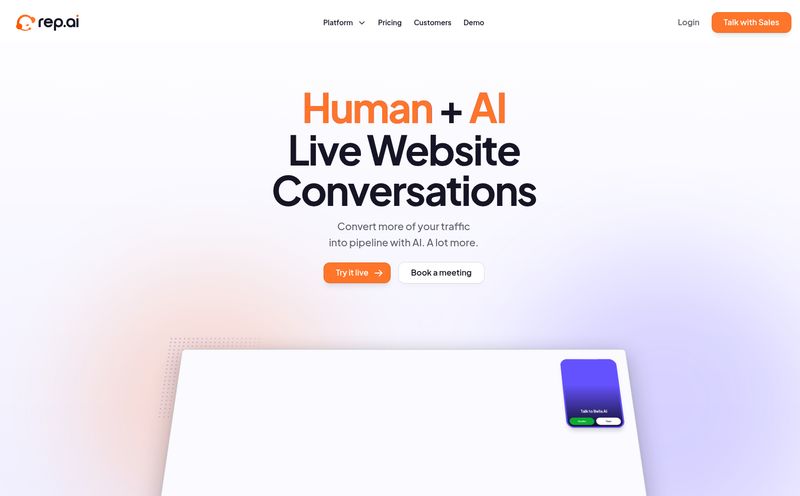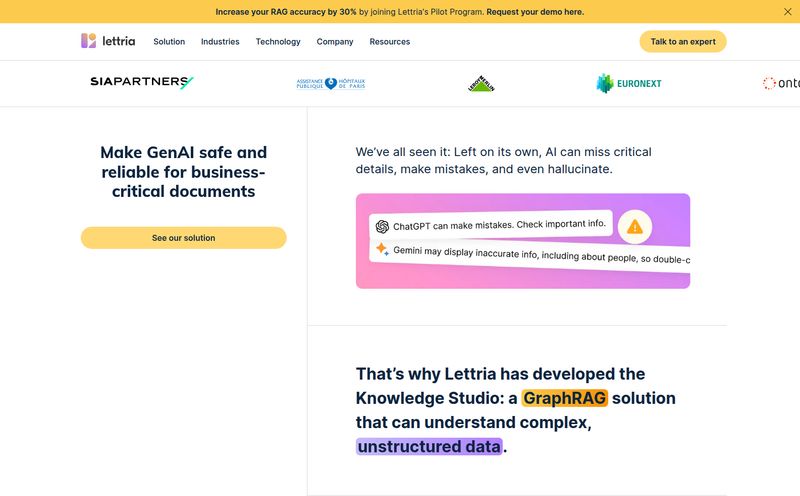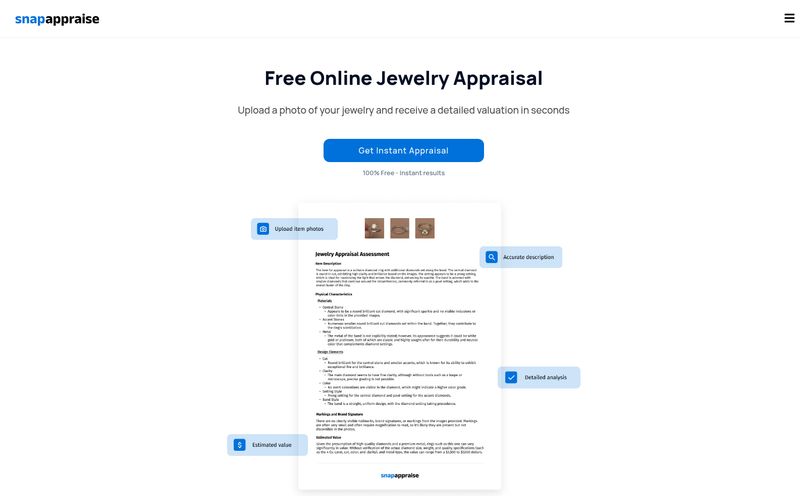We’ve all been there. It’s 2 a.m., you’ve got a weird-looking mole or a cough that just won’t quit, and you fall down the rabbit hole of “Dr. Google.” Ten minutes later, you're convinced you have a rare, incurable disease. It's a cycle of anxiety that, frankly, helps no one. For years, we in the tech and health spaces have been talking about how AI could offer a better way—a smarter, more balanced first line of inquiry.
A few platforms have tried, but I just got my hands on a new contender that’s making some interesting promises: Selpho. It brands itself as an AI-powered healthcare solution, designed to make medical information more accessible. But does it live up to the hype, or is it just another symptom checker with a fancy algorithm? Let's get into it.
What Exactly Is This Selpho Thing?
At its core, Selpho isn't trying to be your doctor. Let's just get that out of the way right now. Instead, think of it as a smart, AI-driven companion for your health journey. It’s a suite of tools designed to give you information and preliminary insights, so you can have more informed conversations with actual medical professionals. It’s built on a three-pronged approach: an AI chatbot, an image scanner, and a medical handbook.
The whole idea is to take some of the panic out of personal health research and replace it with accessible, data-driven information. It’s an ambitious goal, for sure.
A Closer Look at Selpho's Core Features
Okay, let's pop the hood and see what makes this thing tick. The platform is really three main tools rolled into one service.
MediDoc AI Chatbot: Your 24/7 Health Companion?
First up is the MediDoc AI Chatbot. Imagine you could text a nurse anytime, day or night, to ask general health questions. That’s the vibe here. You can ask about symptoms, get information on conditions, or inquire about general wellness topics. In my testing, it was surprisingly conversational. I threw a few curveballs at it, asking about interactions between common supplements, and it provided some pretty solid, well-referenced answers.
It's not just for when you're feeling sick, either. You could use it to ask, “What are some good exercises for lower back pain?” or “Can you explain what 'metabolism' really means?” It's a knowledge tool. The one catch? The free version limits your conversations, which I'll get to later.
Vision DocScanner: An AI Second Opinion for Your Eyes
This is probably the most eye-catching feature, no pun intended. The Vision DocScanner lets you upload an image—say, of a skin lesion, a rash, or something else you're worried about—and its AI analyzes it for potential anomalies. Now, I have to put this in massive, flashing neon letters: this is NOT a medical diagnosis. The company is very clear about this, and so am I.
Think of the Vision DocScanner as a highly-trained magnifying glass. It’s been shown countless images and has learned to spot patterns that might be worth a closer look by a dermatologist or your GP. It’s a tool for flagging, not for diagnosing. It tells you, “Hey, based on our data, this has some characteristics that might be worth getting checked out.” That's it. It’s a nudge, not a verdict.

Visit Selpho
For the worrier in all of us, this could be a powerful tool to bridge the gap between “Should I be concerned?” and actually booking that doctor's appointment. The free plan limits you to 5 of these checks per month, which feels a little restrictive if you're actively monitoring something.
The AI Physician Handbook: A Digital Medical Library
Finally, there's the AI Physician Handbook. This is essentially a massive, searchable database of medical information. It's more comprehensive and reliable than a random Google search. Just been diagnosed with something and want to understand it better without the noise of forums and unverified blogs? This is what it’s for. I see this being particularly useful for medical students, caregivers, or just anyone who is genuinely curious and wants to learn from a more structured source.
Again, the free plan gives you limited access, which is a bit of a tease. You can look things up, but you might hit a wall right when you're getting to the good stuff.
Let's Talk About The Elephant in the Room: The Cost
So, how much will these AI-powered tools set you back? Selpho runs on a freemium model, which is pretty standard for apps these days. But the difference between the free and paid tiers is... substantial.
| Plan | Price | Key Features |
|---|---|---|
| Free Plan | $0 / month | Limited MediDoc AI Chatbot conversations, 5 monthly Vision Checks, limited handbook access, and—this is important—access to older trained models. |
| Premium Plan | $5.95 / month (or $1.95/week trial) | Unlimited everything, full handbook, priority support, early access to new products, and access to the newest AI models. |
That detail about "older trained models" on the free plan is the real kicker for me. In the world of AI, models are constantly being updated and improved. Using an older model, especially for something as sensitive as health, feels a bit like using an outdated textbook. The free plan is a decent demo, but I wouldn't rely on it for anything serious. The Premium plan, at under six bucks a month, seems like a pretty fair price for having the most up-to-date tool in your pocket.
My Honest Take: The Good, The Bad, and The Caveats
After playing around with Selpho for a while, I've got some thoughts. On one hand, I love the mission. Empowering people with better information is always a win in my book. The 24/7 chatbot is a fantastic resource for non-urgent questions, and the handbook is a solid reference tool. It genuinely has the potential to reduce health anxiety by providing a more measured first step than a frantic web search.
However, the limitations on the free plan are pretty significant. It feels more like a trial than a genuinely useful free tool, especially with the use of older AI models. And this brings me to my biggest point, the one I will shout from the rooftops: Selpho is a support tool, not a doctor. It is your knowledgeable friend who reads a lot of medical journals, not your surgeon. The Vision DocScanner can be a great motivator to get a professional opinion, but it should never, ever be the final word.
Some might argue that putting these tools in people's hands could lead to more hypochondria, but I tend to disagree. I think guided, AI-driven information is a much healthier alternative to the wild west of search engine results. This is about being proactive, not paranoid.
Who Should Consider Using Selpho?
So, who is this for? I'd say Selpho is a great fit for health-conscious individuals who like to be informed and proactive. It's for caregivers who need to quickly look up information to better support a loved one. It could also be for someone in a rural area who wants a preliminary, informational check before making a long trip to a specialist. It is absolutely not for someone experiencing a medical emergency or for diagnosing a serious condition. Please, go to the ER for that.
Frequently Asked Questions about Selpho
- Is Selpho a substitute for seeing a real doctor?
- Absolutely not. It's an informational and preliminary support tool. Always consult with a qualified healthcare professional for any medical advice, diagnosis, or treatment. Think of it as a tool to help you prepare for your doctor's visit.
- How accurate is the Vision DocScanner?
- The scanner is designed to detect potential anomalies based on patterns in its data. Its accuracy is in flagging things that might warrant a closer look. It does not provide a diagnosis or a probability of a condition. Its sole purpose is to suggest that a professional consultation might be a good idea.
- What is the biggest difference between the free and premium Selpho plans?
- There are two huge differences. First, the premium plan offers unlimited access to all features, while the free plan has strict limits. Second, and most importantly, the premium plan gives you access to the latest, most up-to-date AI models, whereas the free plan uses older ones.
- Is my health data safe with Selpho?
- As with any health app, you should always read the privacy policy. Reputable companies in this space use anonymization and robust security protocols. However, it's always your responsibility to understand how your data is being handled before you upload personal information.
- Can I use this for my kids?
- While you could use the handbook for general information, I would exercise extreme caution using any AI symptom checker or image scanner for children. Pediatric medicine is highly specialized. Your first and only call should be to your pediatrician.
The Final Word on Selpho
So, is Selpho the future of personal healthcare? Maybe not the entire future, but it's a fascinating and promising step in the right direction. It successfully walks a very fine line, offering powerful AI-driven insights without overstepping into the realm of actual medical practice. It puts a tool in your hands that encourages proactive health management and informed decision-making.
As long as users understand its role—as a helpful, intelligent assistant, not a digital doctor—I think Selpho could become an invaluable part of many people's wellness toolkit. It’s an exciting glimpse of a future where we can all be a little more engaged and a little less anxious about our own health.



